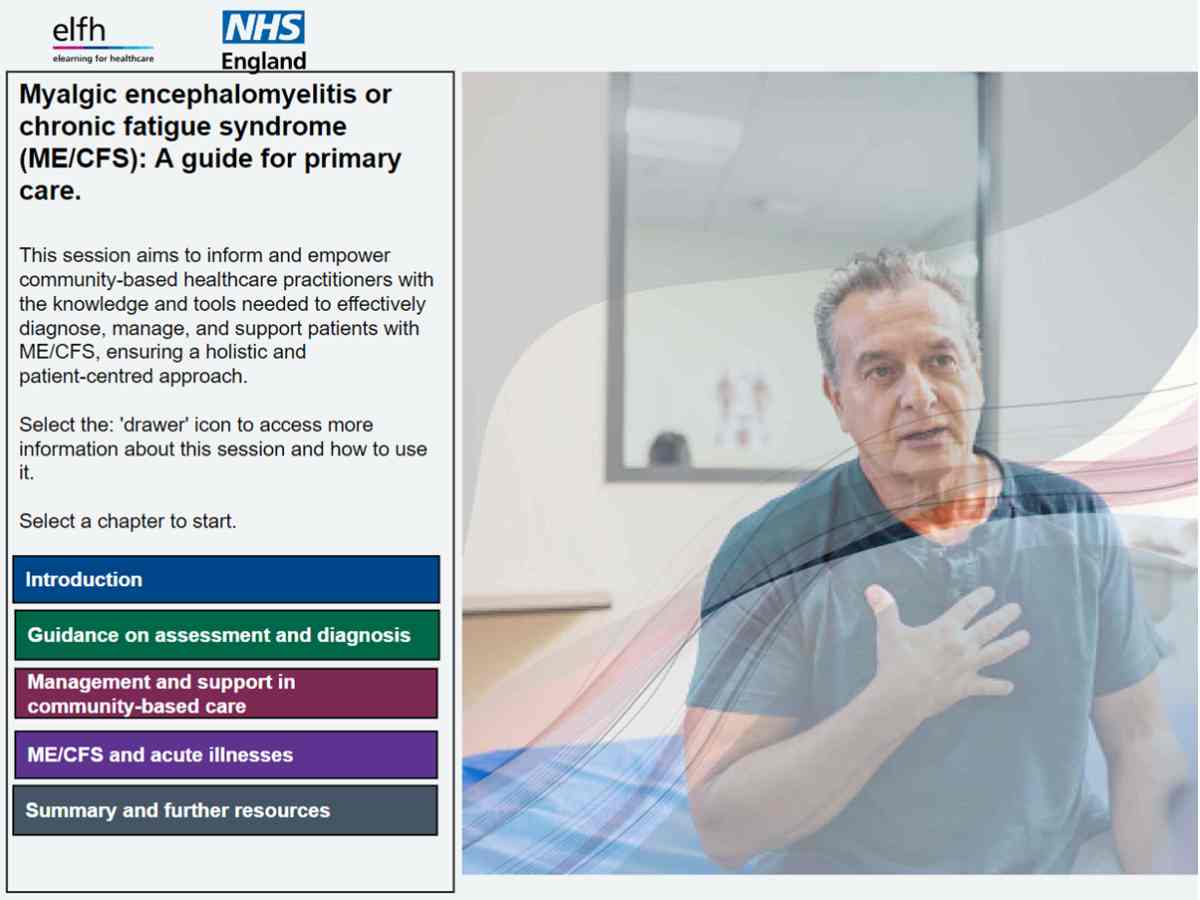The Canary has been leaked a draft copy of the second NHS eLearning module on myalgic encephalomyelitis (ME/CFS). It comes after patients have been expressing growing concern on social media over it. Those concerns seem well-placed – because there are some gaping holes in the NHS ME/CFS module’s content.
The second NHS ME/CFS module
In short, this is the second of three modules the NHS is rolling out. The first one was met with a muted response by many people with ME. However, predictably the charities endorsed it. The module was aimed at ‘anyone’ with an interest in the disease, and gave a basic overview.
This second module, however, is aimed at primary care healthcare practitioners: primarily GPs. It is at the bottom of this article.
It was co-written by Dr David Strain, as was the first one. He is a controversial figure. Strain admitted at the inquest into the death of Maeve Boothby O’Neill that he was not an ME specialist. Yet, here we are.
It would be unfair of me to slam the NHS ME/CFS module in its entirety. The text does repeatedly emphasise how doctors and the state have stigmatised ME for so long. It is thorough in terms of background and diagnosis. It is easy to understand. And it is a vast improvement on what’s come before it.
However, this cannot detract from the fact there are some glaring and dangerous issues with it.
A failure to understand the impact of exertion and PEM combined
The standout issue from the NHS ME/CFS module is its failure to recognise that any exertion resulting in post-exertional malaise (PEM) can cause a permanent deterioration in the patient’s health. In short, exertion or any increase in activity levels (mental/physical/emotional) can cause PEM and therefore a permanent deterioration.
The fraudulent and completely false idea that exercise is a treatment for the disease has been the bedrock of its psychologisation for decades. Even to this day, doctors are still prescribing this to people with ME – because they still believe it to be true.
So, the module does explain that exertion can cause PEM and therefore a worsening of symptoms. But it does not state that this can cause permanent harm. Therefore, an unwitting GP would be forgiven for thinking that the benefits of exercise would outweigh the risks.
An example of this is where the module says:
Encouraging mental activities that are enjoyable but not exhausting.
Mental exertion in itself can cause PEM, therefore long-term deterioration too.
However, there are other issues with the NHS ME/CFS module as well.
Multiple other issues
For example, it mentions mast cell activation syndrome (MCAS), says it is often mistaken for ME, says that “it is also possible to have ME and MCAS simultaneously” – but fails to explain how MCAS presents or what testing (like bone marrow trephine/aspirate) is possible, and what medication can be prescribed.
The recommendations for sleep disruption are laughable (like “cognitive behavioural therapy for insomnia”) – given that in ME this is likely caused by hormonal disruption affecting the circadian rhythm. ‘Think your sleep better’, though.
The module discusses orthostatic intolerance (OI), recognises this is not exactly the same as postural orthostatic tachycardia syndrome (POTS), but fails to say that primary care practitioners would need to check for the latter as well. For OI, it also mentions that midodrine is a medication option, but fails to say that only a specialist cardiologist can prescribe this.
Gastrointestinal issues
Moreover, the common denominator in severe and very severe ME patients is an almost, if not complete collapse in function of their gastrointestinal system. Yet the entire module downplays this as either ‘nausea’, difficulty chewing or swallowing’, and “IBS” – the latter being a misnomer in itself. It lists the causes of malnutrition as:
• fatigue
• reduced appetite
• nausea
• altered sensitivity to tastes/smells/textures
• inability to shop, cook or feed oneself
• difficulty swallowing and chewing
• disrupted sleep and meal patterns
• food intolerances and/or restrictive diets
• financial constraints, due to reduced ability to work
The NHS ME/CFS module fails to say what severe/very severe ME patients are actually experiencing is a combination of:
This is because the NICE guidelines don’t even recognise this. Overall, the above represent huge issues with this module.
Disastrous failures of joined-up thinking
It is likely that many people have severe/very severe ME because of the co-morbidities they live with. I have witnessed it firsthand with Carla Naoum. She clearly has POTS, MCAS, and gastroparesis all playing havoc with her body. However, all of these West Middlesex hospital is either ignoring or downplaying. I witnessed firsthand in Millie – and it seems a similar story with patients like Sami Berry and Alice Barrett.
So, the module not only fails to recognise exertion = deterioration, but deterioration = highly dangerous for co-morbidities.
The NHS ME/CFS module not making it clear that any exertion resulting in PEM can cause a permanent deterioration is negligent, at best. At worst, it is an intentional misrepresentation by people who still believe that exercise regimens have a place in ME care.
The module failing to then highlight co-morbidities like MCAS properly, let alone explain that management of them is crucial to prevent further deterioration, is not an oversight. It is because the people writing the module are a) following NICE guidelines (which I warned when published were not good enough), and b) don’t even understand this themselves.
Finally, just to add insult to injury the module links to the thoroughly discredited BACME at the end – as well as the two main not fit-for-purpose charities. If you don’t know the problems with BACME, you can read my colleague Hannah Sharland’s investigations into the group here.
I have personal experience of how damaging the organisation is as well, via Millie McAinsh’s hospital the Royal Lancaster Infirmary’s over-reliance on them.
NHS ME/CFS module: back to the drawing board
I emailed the lead contact on the module, offering the right of reply to the concerns I raised. In the interests of transparency this was late on Friday 4 October. I did not receive a response as an out-of-office reply told me Friday was their ‘non-working day’.
Usually in this situation, a journalist would wait until the respondent has had a chance to reply during the working week. However, given the cut off for responses to the module is Monday 7 October, I have decided to publish anyway.
I have grave concerns that this second NHS ME/CFS module shows the authors complete failure to understand ME in its severest forms. However, it also shows a basic lack of understanding of the disease overall. Moreover, as an eLearning guide for GPs it will do little to prevent a patient’s deterioration from the disease.
To sum up, as the module states:
The next session in this programme will deal with the modifications that are required in order to manage a patient with severe ME/CFS in the hospital setting.
Given the errors and general downplaying of the severity of ME in this module, I hold out little hope for the next.
You can read the full module below:




